Spotting a gap in Malay cuisine, this S’porean family started a restaurant serving halal wine

When Vulcan Post was invited to a media tasting at Aleeya, the first thing that stood out to me was their halal wine.
Admittedly, I had low expectations—I assumed that the wines would just taste like grape juice. And pairing them with Malay-Indonesian cuisine? I wasn’t too convinced if the combination would even work.
Yet, I was left pleasantly surprised. The red and white halal wines we had tasted pretty much like the real deal, just that they were a tad lighter on the tastebuds.
And they also paired really well with the food—they complemented the bold, rich flavours of the dishes we tried. But how do these wines maintain the same flavour as regular wine?
Why pair wine with Malay-Indonesian food?
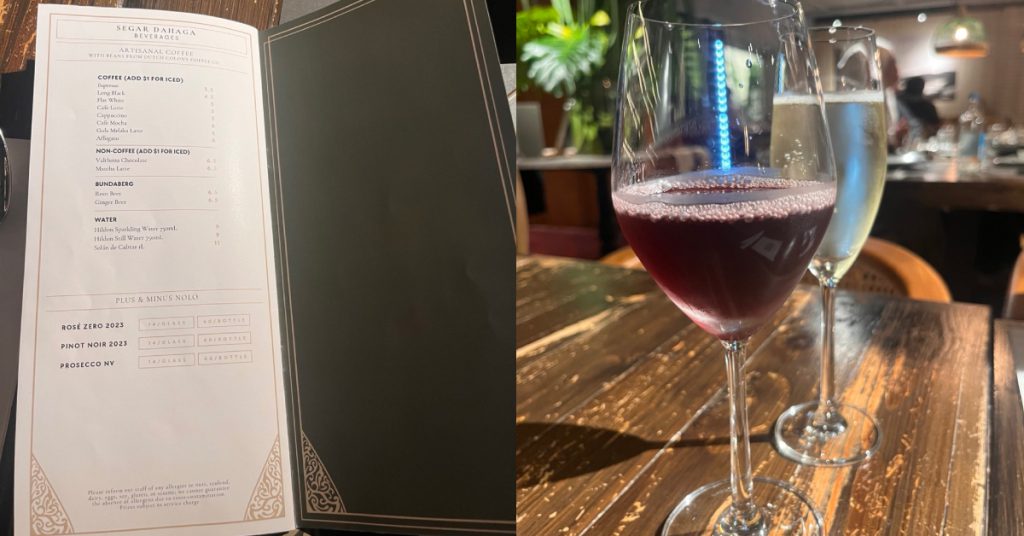
Aleeya’s wines are made in the same way as traditional wine, so no flavour is lost in the production process. The key difference comes at the final step, when they dealcoholise the beverage.
Dealcoholisation is commonly carried out through a process called vacuum distillation, which allows the alcohol in wine to evaporate at much lower temperatures. This ensures that the wine’s characteristics are not altered by heat, safeguarding the flavour and aroma of the beverage.
Another method that is often used is reverse osmosis, which separates alcohol and water from wine, while preserving its flavour compounds. These separated flavours are then blended back with the wine’s base, resulting in a non-alcoholic product that maintains its original taste.
Through these methods, Aleeya ensures that its wines retain the full-bodied flavours of traditional wines, while catering to consumers who do not consume alcohol.
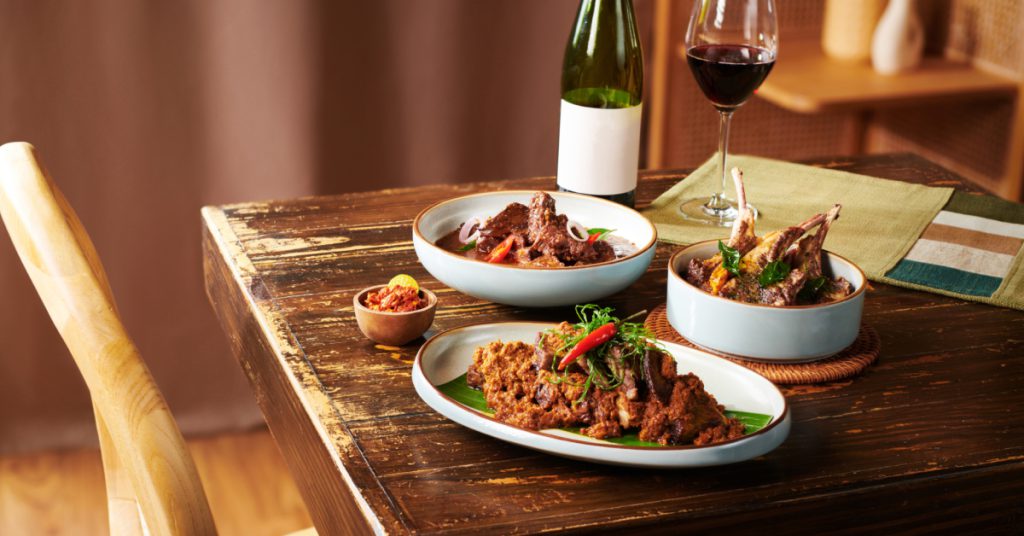
But the restaurant’s halal wine isn’t the only “new experience” it wants to offer to the local community.
If you look closely at their menu, you’ll find familiar dishes reimagined with unique twists, like the Asparagus Goreng Belacan and Dendeng Wagyu Belado.
Behind the venture is three family members—Hairul Isa, Najeeb Ali, and Reza Ali—who saw a gap in the market for Malay cuisine.
Most choices in Singapore either lean towards fine dining or casual hawker fare, hence, the trio is seeking to fill this gap with Aleeya, by offering a “more refined dining experience” for mid-range diners.
The founders have worked in F&B for over 10 years
All three founders of Aleeya have been extensively involved in the F&B industry over the past decade.
Though Hairul started his career working for an MNC in the logistics and supply chain industry, he decided to venture into F&B as a side hustle together with Reza back in 2010.
The latter had picked up cooking skills from his parents, who were previously involved in the catering and wedding events industry.
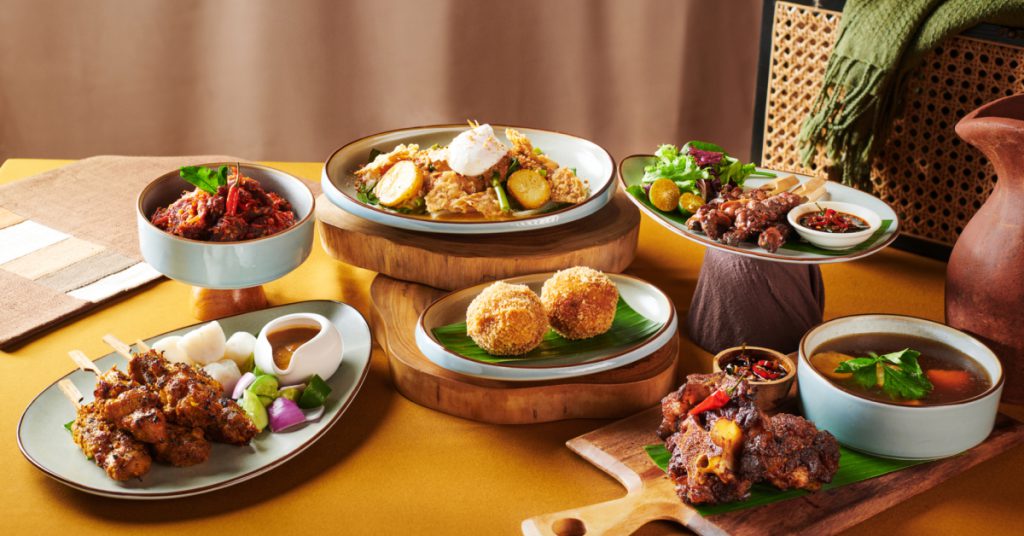
Hairul and Reza started out by investing S$30,000 from their personal savings to start a Nasi Padang kiosk at a polytechnic. “Back then, [the venture] was meant to be [a source of] passive income [for me] while I still worked at the M&C,” shared Hairul.
Unfortunately, their business struggled and lasted only a year. Undeterred, Reza suggested that they try their hand at night market pop-up stores during festivals like Ramadhan.
Their street food offerings became an immediate hit, and this success drove the two of them to explore more opportunities in the space, though they each pursued their own path.
Reza established his own business specialising in Middle Eastern and Malay cuisine, providing catering services and cooking for major events at venues like Expo and Suntec, while Hairul went on to start up various F&B brands across the city-state over the past seven years.
These ventures include Asian smokehouse Cherry & Oak, Asian fusion restaurant Walaku, cafe and brunch spot Mondays, as well as artisan dessert shop The Brulee.
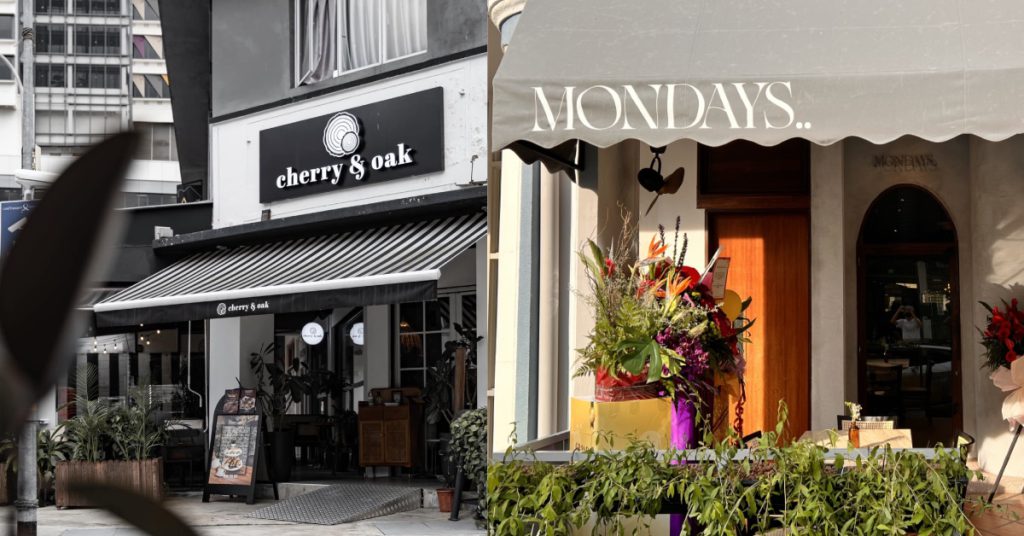
The idea to start Aleeya came during a trip abroad, when the duo, joined by Najeeb, savoured an array of Malay-Indonesian dishes.
“As we enjoyed the food, we realised that there was a lack of such offerings in Singapore,” shared Hairul.
This led Najeeb, who’s had experience working in hotels and restaurants including Marina Bay Sands, to leave full-time employment and join the duo to start Aleeya.
Singapore’s F&B space still has “many opportunities”
The name Aleeya is a tribute to Hairul’s late father-in-law and mother-in-law. It is a combination of both their names: Ali and Dahlia.

The restaurant’s dishes are made from scratch in-house, from the spices and pastes to the sambal. Each one demands hours of cooking, but the effort is worthwhile according to the trio as they follow recipes that were passed down by Ali and Dahlia.
However, they have also chosen to modernise some of their offerings and including options like halal wine to strike a balance between preserving tradition and appealing to modern tastes.
Alcoholic beverages are typically paired by western cuisines, but when we tried pairing the dealcoholised wine with Malay cuisine, it surprisingly went well. Our halal wines are well received, especially by the younger crowd.
Hairul Isa, founder of Aleeya
Though Aleeya has only been open for four months, Hairul shared that the restaurant has already attracted many regulars, including some Ministers.
Looking forward, he is confident that there are “many opportunities” in Singapore’s F&B industry, particularly when it comes to halal cuisine. Hairul hopes to be able to build and execute more concepts like Aleeya in the coming years.
Also Read: How this S’porean duo’s beauty chain aims to stand out against giants like Sephora & Sasa
Featured Image Credit: Aleeya
Singapore 2025 job outlook: Who is hiring next year? Here’s what the data says.
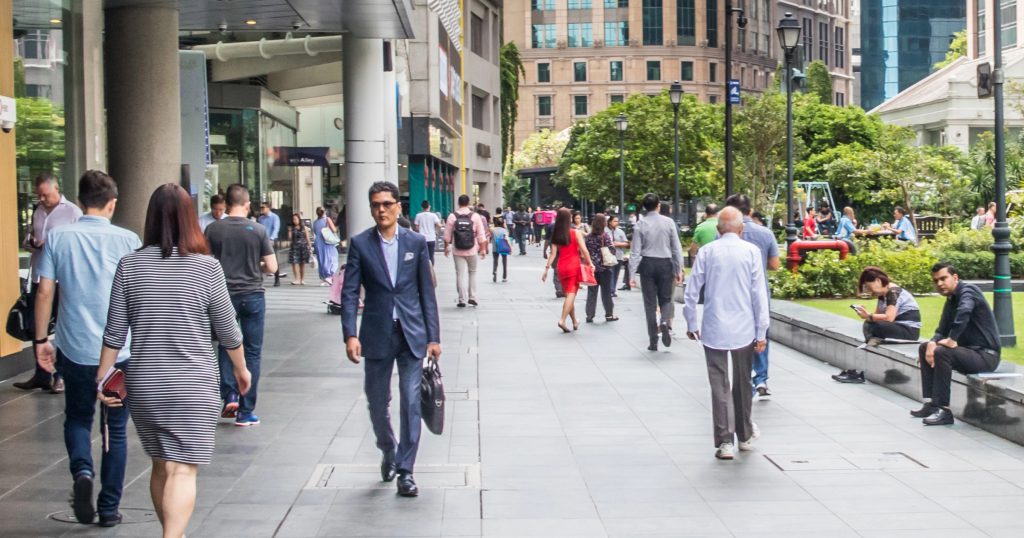
With the arrival of 2025, we’re entering the second half of the decade which started with the worst pandemic in a century.
Fortunately the economic situation has greatly improved in Singapore this year, with stabilising prices and strong economic growth as real GDP growth is expected to hit 3.5% or more—an excellent result for a highly developed economy.
And the good news doesn’t end there as the next year forecast for the city remains optimistic, with another expansion of 2.5% or more, which is bound to boost employment as well.
Speaking of which, ManpowerGroup, among others providing measurable information on the local labour market, has recently published updated forecasts for Q1 of 2025, according to which 45% of employers are planning to increase hiring, against just 20% anticipating a drop.
This adds up to a positive net employment outlook (NEO) of +25%, meaning that more jobs should be available than are expected to go away.

Such a synthetic figure, however, is not enough to provide guidance as to what to expect in the coming months. We need to know who those employers might be, the industries they represent and the opportunities they may provide.
So, let’s break down what we know.
Who is hiring, again?
About 45% of Singapore employers (with a reported margin of error at around +/- 3.9%), representing mostly larger companies, with NEO hitting nearly 50% for businesses employing up to 5,000 people.
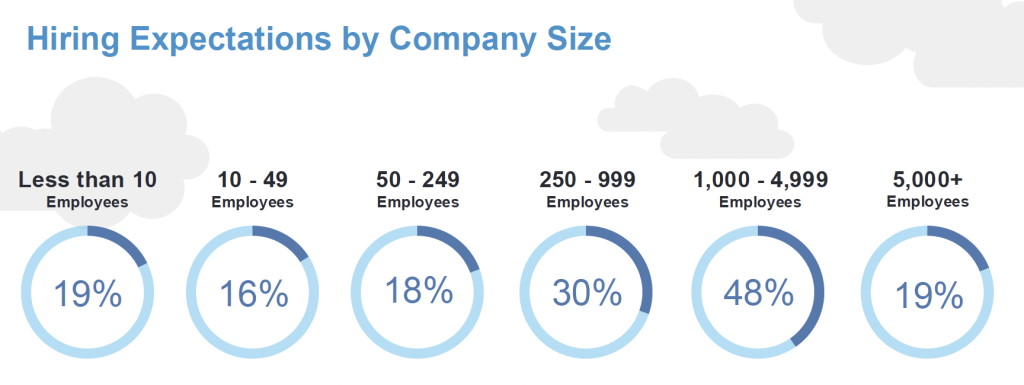
This is rather excellent news since it’s those large employers who tend to provide more attractive career paths, especially in a place like Singapore which is a hub for sophisticated services rather than cheap manufacturing.
The most optimistic industry is transportation, which is receiving a boost following pandemic-induced disruptions of both falling and soaring demand for its services, as a net of 67% of businesses are looking to hire in the next few months.
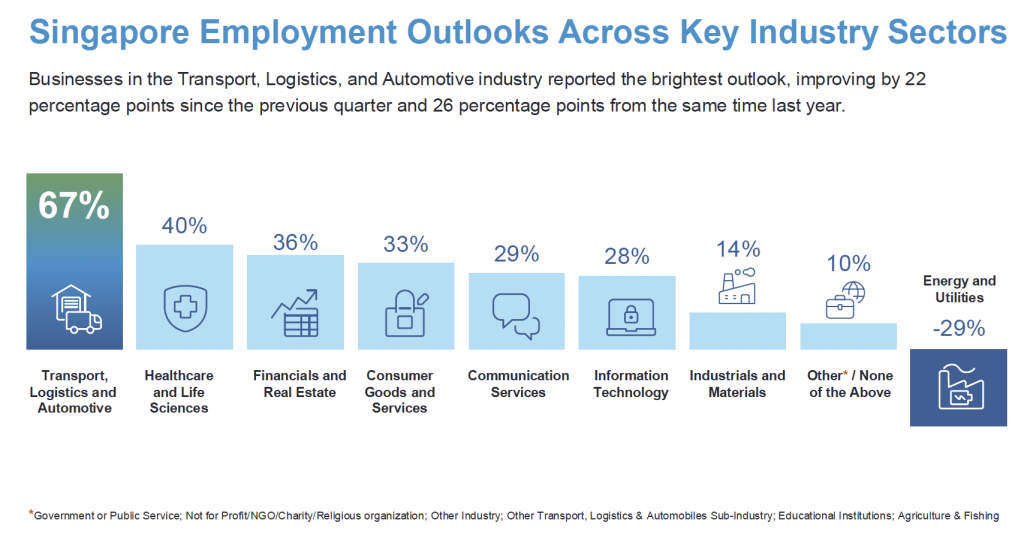
And logistics is a litmus test for the health of the economy—especially for one as dependent on trade as Singapore.
High demand for transportation suggests that other businesses are doing well, if they have things that need shipping, which also increases their demand for other services (finance, tech, sales, marketing).
And indeed, the outlook is strong for most industries, with healthcare, finance, consumer goods, communications and IT all reporting above average NEO of around 30 to 40%.
Given that some companies are always looking to trim their headcount, it means that around half of the businesses in those areas are still looking to do just the opposite: employ more.
There is only one sector where employment outlook is negative (and quite significantly), continuing its negative run from Q4 of this year—and that’s energy & utilities.
If that’s where you’re employed, then keep your ear to the ground and consider the alternatives in growth industries. Just in case.
Salespeople wanted
Another recent survey, this time published by Randstad, reveals specific positions within businesses that employers will be seeking to boost in 2025, with those contributing to the bottom line leading the ranking of responses:
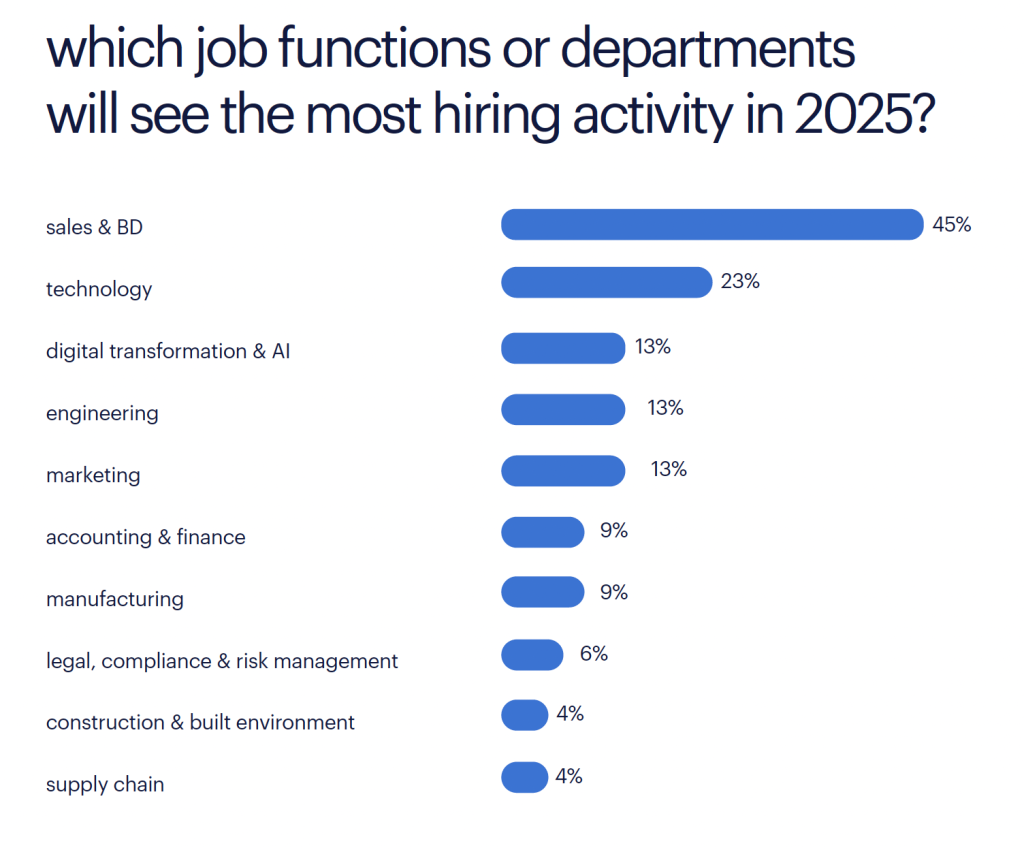
Close to half of the surveyed businesses are anticipating to employ more sales and business development people, perhaps in the hope of capitalising on optimism about the Singapore economy.
Technology is important for just a quarter of the respondents, with AI coming in third at just 13%. It may seem that there’s a fundamental transformation upon us, but businesses are taking a more cautious approach when it comes to employing dedicated staff to handle it.
MOM reports positive signs as well
While the Ministry of Manpower doesn’t publish detailed forecasts, the trailing, real data on the labour market it regularly reports suggests that the optimism is reflected by reality.
In its recent report on Q3 hiring trends, it indicated a doubling of pace of hiring between subsequent quarters, including 4,000 resident hires in sectors like IT, professional and financial services.
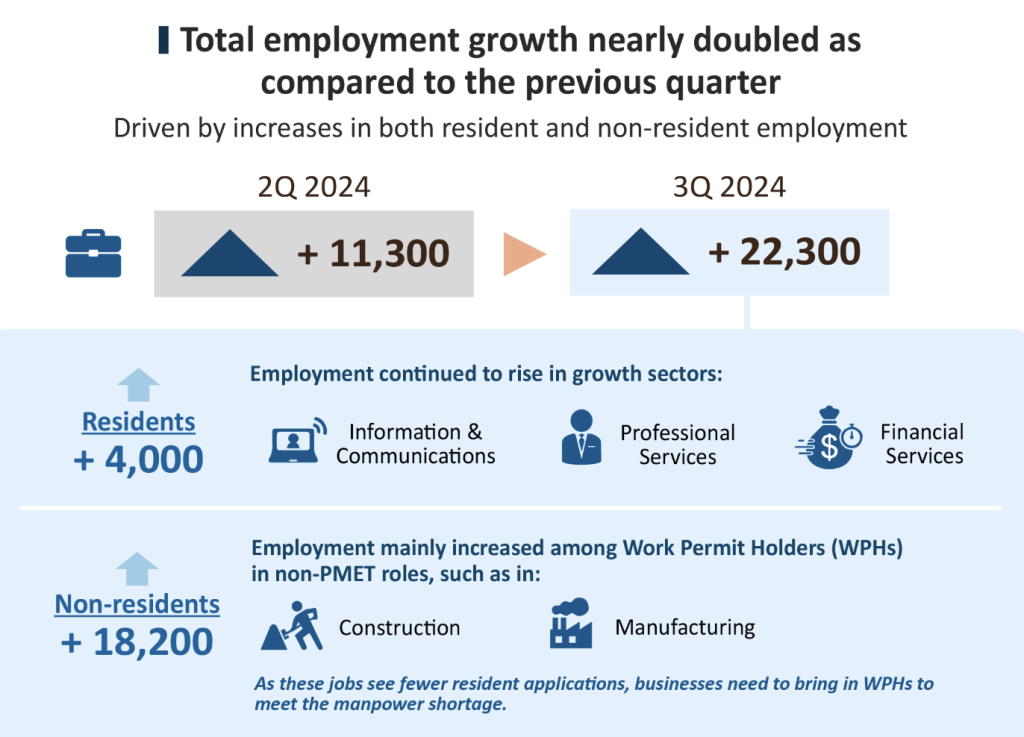
As usual, non-resident employment is considerably higher, but limited mainly to jobs that Singaporeans don’t want to do.
Big companies looking for money
All in all, the picture that these data points paint is that 2025 is going to be a year during which larger employers will be looking to capitalise on the opportunities that the local economic growth is going to bring, focusing on employing people who can bring in new business or are able to contribute to its technological competitiveness.
Artificial intelligence does show up on the radar, but doesn’t seem to have quite the profound impact on hiring decisions—either yet or not anymore, as we’re still waiting for practical breakthroughs the new technology can introduce in the office, calling into question claims of some that “AI can already do all the jobs.”
For the time being, it seems that 2025 is not going to be the year you should worry about losing your job to a smart chatbot.
Also Read: Billionaire CEO stops hiring as AI “can already do all of the jobs”, but promises higher pay
Featured Image Credit: iStock